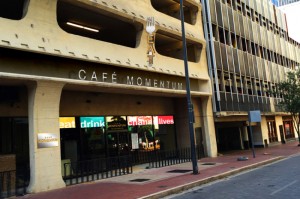Appears in Bridging the Opportunity Divide by Lorraine Chow on December 8, 2014
Cafe Momentum Executive Director, Chad Houser, with alumni Malik Runnels.
Courtesy Cafe Momentum
This innovative program aims to take formerly incarcerated youth out of the cycle of crime.
A hot, new restaurant is coming to downtown Dallas early next year. But Café Momentum does more than just serve food.
As Good News Network reports, the nonprofit restaurant will be staffed by boys and young men that have served time at the Dallas County juvenile detention center.
According to the Christian Science Monitor, the new restaurant will allow 30 to 35 formerly incarcerated youths to take part in a 12-month internship that pays $10 an hour (well-above state minimum wage), learning the ins and outs of the restaurant business, such as food preparation, assisting chefs, waiting tables, and washing dishes. They interns will also take classes on financial literacy, anger management, art and social media.
The Café Momentum program started off as a pop-up restaurant concept in 2011, and more than 40 dinners have been held since. These once-monthly events are held in restaurants around the city, where patrons dine on a gourmet meal designed by a popular chef, with food prepared and served by the formerly incarcerated youths. CS Monitor notes that Café Momentum’s dinners usually sell out — bringing in $8,000 to $10,000 each in ticket sales and donations.
A rendering of the new Dallas restaurant opening in January 2015. Courtesy Cafe Momentum
The program is so much more than giving these kids a job; it’s an opportunity for them to stay out of the prison system. Co-founder Chad Houser (who will also serve as executive chef at the new permanent restaurant) says in the video below that while the recidivism rate for juvenile offenders in the state of Texas is 47 percent, of the 160 kids he’s worked in the last three years, their recidivism rate is only 11 percent.
“[This] means that in a little over three years we’ve saved Dallas county taxpayers almost $8 million,” Houser says. “That’s almost $130 million in deferred in lifetime savings from keeping them away from being career criminals. Think about all the lives that could be changed, all the good that could be done in this community with that money.




